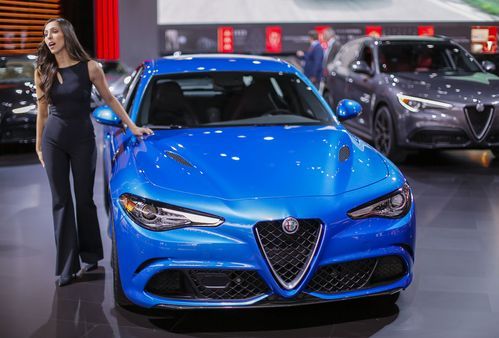
A 2018 Alfa Romeo Giulia is shown during a media preview at the 2018 North American International Auto Show in Detroit in January 2018.
(Photo: Erik S. Lesser, EPA-EFE/REX/Shutterstock)
The term generic might imply a reasonable, cost-effective choice at the grocery store, but Fiat Chrysler Automobiles CEO Sergio Marchionne says it’s no way to think about cars.
Brands matter, and they will matter even more for automakers if automation and artificial intelligence become dominant features in the auto industry as expected.
Marchionne delved into the importance of brand identity as he spoke about the future of Alfa Romeo in January at the North American International Show in Detroit. Marchionne explained that he didn’t expect the payoff from the reintroduction of the Alfa brand before 2022.
He highlighted the potential of a storied brand like Alfa Romeo, noting that if an automaker’s brands are worth attending to, such as Alfa, then the automaker should remain successful.
“Generic brands, on the other hand, will have a tough time because then they become indistinguishable, and if they become commoditized, then the price will give you everything that matters,” Marchionne said.
That idea makes sense to Mike Bernacchi, a marketing professor at the University of Detroit Mercy.
“I certainly hold the position that the idea of a brand and brand names are key,” he said. “Once you lose your identity, you lose a major reason for purchasing.”
Bernacchi sees particular pitfalls in the development of self-driving vehicle technology, where companies such as General Motors, Waymo and others are essentially in a race. He called it a generic type of competition.
“Everybody wants to be ahead, but they better not lose their distinctiveness of the brand,” Bernacchi said, noting the many years that have gone into creating each vehicle brand identity. “If generic ever becomes a (capital) G in the industry, the industry is in trouble.”

Sergio Marchionne, CEO of Fiat Chrysler Automobiles, answers a question during a press conference at the 2018 North American International Auto Show in Detroit on January 15, 2018.
(Photo: JEWEL SAMAD, AFP/Getty Images)
He cited Super Bowl advertising as an example of the focus that automakers, which he said typically lead spending during the big game, put on brand maintenance. Fiat Chrysler Automobiles, for example, had five ads this year, and the cost for a 30-second spot exceeded $5 million.
Read more:
Fiat Chrysler exec who led Dodge Demon launch to oversee Alfa Romeo, Maserati
Alfa Romeo launches Stelvio SUV, but brand building will take time
A strong brand identity can also make people take notice even when the market shifts, as it has for passenger cars compared to trucks and SUVs.
Tim Kuniskis has a theory about that. Kuniskis was named this week to lead Alfa Romeo and Maserati after overseeing FCA’s passenger car brands in North America. Kuniskis’ attention in the recent past has often been on muscle cars, such as the Dodge Demon.
Cars that stand out, as opposed to “vanilla A-to-B commoditized sedans,” have continued to sell, he said, pointing as an example to the Dodge Challenger. Sales of the Challenger held better than steady last year, with a slight increase of 0.5% compared to 2016.
“(Do) you want to buy a midsized sedan that is $28,000 to $30,000 that gets 36 miles per gallon and you’re going lose it in the mall parking lot or do you want to buy a 300-horsepower V6 … that is $28,000, gets 31 miles per gallon and the difference of 5 miles per gallon, on a 12,000-mile-a-year car, is going to be dollars per month. And you’re going to have the kickass red one with the spoiler and the 20-inch wheels. I’ll take that one,” Kuniskis said.
Contact Eric D. Lawrence: elawrence@freepress.com. Follow him on Twitter: @_ericdlawrence.
Read or Share this story: http://on.freep.com/2nIhxzu
